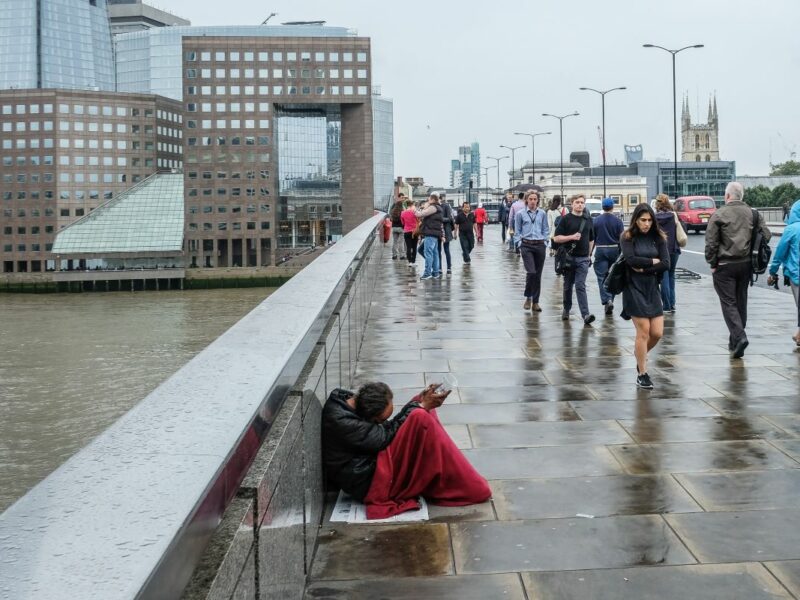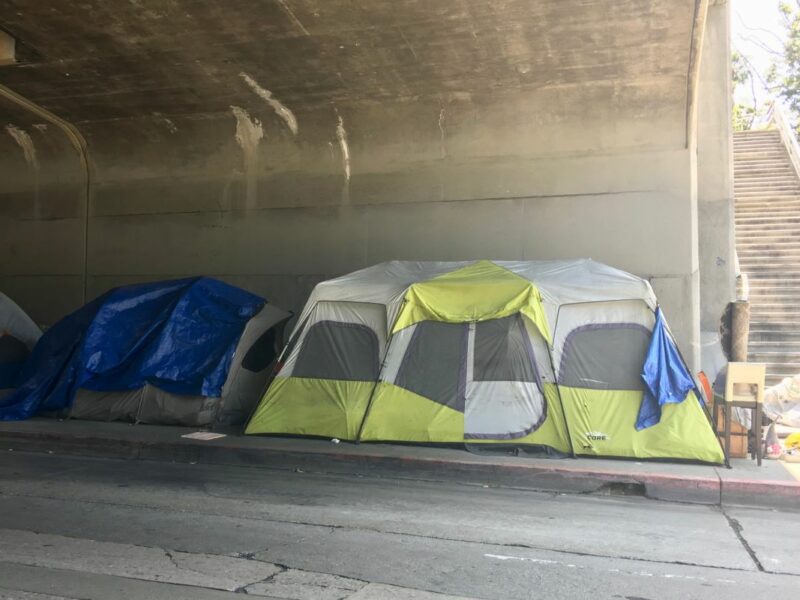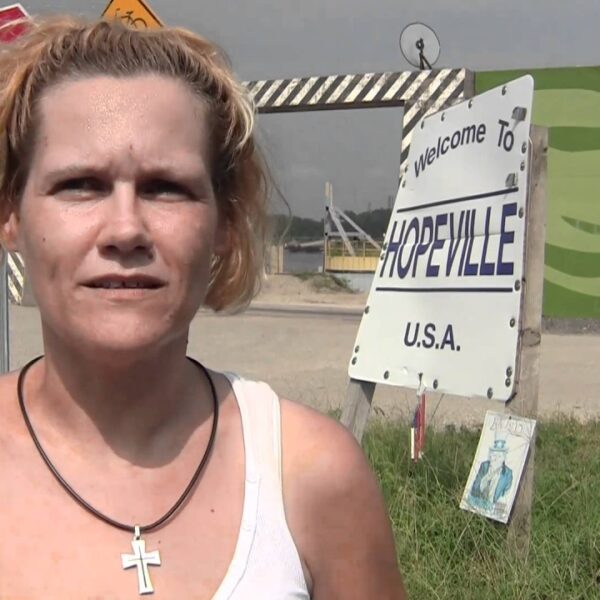Through Their Eyes, the Problem Isn’t Human Suffering – It’s the Homeless People Blocking Their View
The shadows of a tent city loom in the background of a luxury development in Portland, Oregon. It is a place where the widening wealth gap is evident.
On one side of the river, wealthy residents indulge in boutique-style amenities. They sip lattes from the towering tops of opulent sky terraces where breathtaking views of the city stretch as far as the eye can see. They stare out at the other side of the river from their gourmet kitchens, through their floor-to-ceiling windows, and what do they see?
Usually, they see a shimmering skyline that perfectly compliments the glistening river below. Lately, though, they’ve seen dozens of hand-built cabins and makeshift shacks.
A homeless encampment is creeping up along the water’s edge. It is a place littered with tragedy where residents endure a humble existence on a rough patch of dirt where the rail yard sits. Here, you will find residents who lack the most necessities like bathrooms, faucets, and places to wash their hair.
These slum-like conditions are the result of the widening wealth gap mentioned above.
They are evidence of a social system where rent increases have quadrupled the pace of median wages, and low and middle-income earners have been completely priced out.
First, they were priced out of the luxury market, then the homeownership market, and now even the rental market has hung them to dry. So, they wind up here, at the river’s bend in a real-life No Man’s Land. And when the rich look out across the river and see this, they recognize that there’s a problem.
But through their eyes, the problem isn’t human suffering, poverty exploitation, a lack of affordable housing, or a decline in the living wage. The problem, from their perspective, is that these lowly peasants have the nerve to be blocking their view.
This is not an exaggeration. These luxury condo owners were interviewed, and they complained about the obstruction of their “million-dollar views.”
Worse still, the press covered the story by painting these compassionless NIMBYs in a vaguely sympathetic light. The coverage wasn’t even neutral; it was unapologetically NIMBY leaning.
Not only did the coverage speak only about the view, but out of all the encampment residents to interview, the press quoted only the woman who allegedly refused to go to a shelter because she preferred using drugs.
Pushing a shelter-resistant homelessness narrative amid an economic downturn, on the brink of a recession, at a time when vehicular homelessness has reached a historic high isn’t just cruel. It’s also irresponsible.
But hey, that’s my view. Here’s a look at theirs.
NIMBYs Call Homeless Encampment an Eyesore. Media Supports Their Abhorrent Position.
In a blatantly NIMBY-leaning post published on the subject, lofty luxury apartment residents sob and moan about the Portland-based homeless encampment in their vicinity. Their complaints are not centered on the fact that their fellow human beings are forced to live this way while they enjoy their self-proclaimed “prime real estate.” No. Their entire argument is about them and how the homeless population is marring their otherwise pristine view of the city.
The article subtly suggests they deserve to be upset. Not the homeless people who lack electricity, running water, and a baseline level of respect from their peers, but the rich people who’ve placed 40 phone calls complaining to the city. They are millionaires, after all, so they must be right.
The condo dwellers even go so far as to ask who they could turn to for help as if they were the victims in this scenario. A therapist is the correct answer since they lack even the slightest compassion.
Journalists Cite Not Being Able to Criminalize the Homeless Population as the Main Problem
Coverage of the encampment is a far cry from insightful. The root causes of homelessness aren’t mentioned. The harrowing housing crisis isn’t listed anywhere.
We get to meet one alleged houseless resident who conveniently fits every negative stereotype possible. She’s an addict with mental health issues and personality disorders who refuses services because she’d rather do drugs than live in a house. And we, the general public, are subtly being told that every other person in the homeless encampment must fit this description too.
We are also forced to believe the person interviewed is not made up, despite being a painfully painted caricature of unsheltered homelessness.
Never mind that homelessness in the region has increased by 45% since the pandemic. Forget the fact that Multnomah County has 4,000 homeless people and only 1,400 emergency shelter beds. Don’t even get started on the fact that rental rates in Portland increased by a whopping 40% in the past year.
Investigative sources have identified the real problem. According to them, it is “that the area is challenging to reach and as it is not directly on land owned by the rail yard, it’s unclear who is in charge of the shoreline.”
In other words, since nobody owns the land, nobody has the right to roll in the bulldozers backed by police officers and start making arrests and trashing people’s belongings. This is just the mentality we need to open our eyes to. Like a virus, it is spreading far and wide.
Talk to Your Legislators About Ending Homelessness, not Just Banishing it from Sight
We’ll never beat the homeless crisis if we don’t start having more empathy for the people it hurts most, our neighbors on the railroad line with shacks upon the river.
There is a difference between looking at them and truly seeing them. Let’s take this time to see them and speak up on their behalf.
Luxury condo residents Larry Purtle and Ric Scaramella contacted their local authorities 40 times to voice their inhumane opinions. Could they care more about their precious real estate than the rest of us care about the real state of humanity? Talk to your local legislators today.













